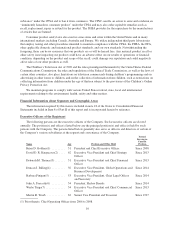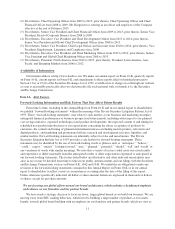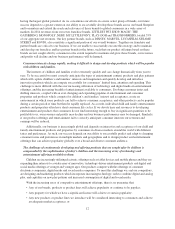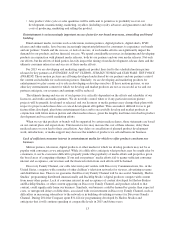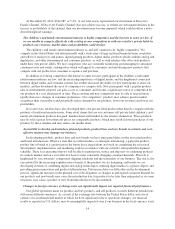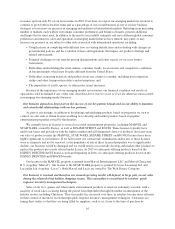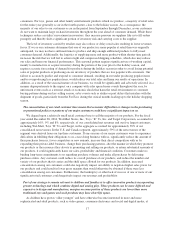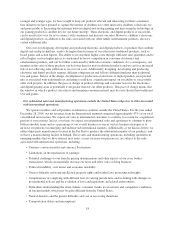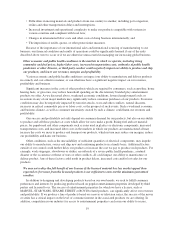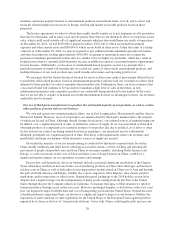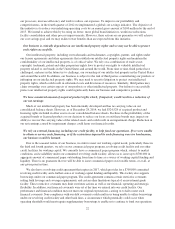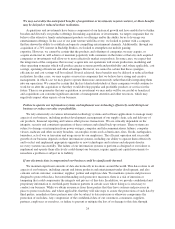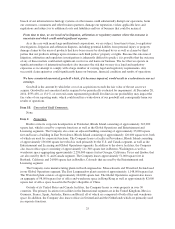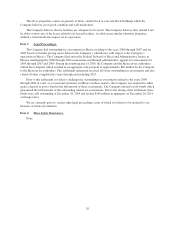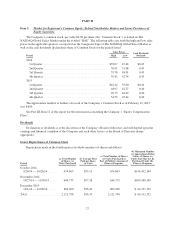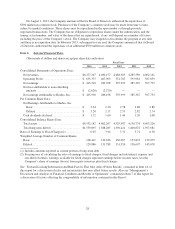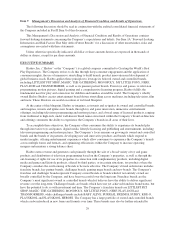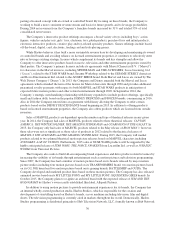Hasbro 2014 Annual Report Download - page 34
Download and view the complete annual report
Please find page 34 of the 2014 Hasbro annual report below. You can navigate through the pages in the report by either clicking on the pages listed below, or by using the keyword search tool below to find specific information within the annual report.maintain, and renew popular licenses to entertainment products on beneficial terms, if at all, and to attract and
retain the talented employees necessary to design, develop and market successful products based on these
properties.
The license agreements we enter to obtain these rights usually require us to pay minimum royalty guarantees
that may be substantial, and in some cases may be greater than what we are ultimately able to recoup from actual
sales, which could result in write-offs of significant amounts which in turn would harm our results of operations.
At December 28, 2014, we had $230,840 of prepaid royalties, $132,146 of which are included in prepaid
expenses and other current assets and $98,694 of which are included in other assets. Under the terms of existing
contracts as of December 28, 2014, we may be required to pay additional future minimum guaranteed royalties
and other licensing fees totaling approximately $506,000. Acquiring or renewing licenses may require the
payment of minimum guaranteed royalties that we consider to be too high to be profitable, which may result in
losing licenses that we currently hold when they become available for renewal, or missing business opportunities
for new licenses. Additionally, as a licensee of entertainment-based properties we have no guaranty that a
particular property or brand will translate into successful toy, game or other family entertainment products, and
underperformance of any such products may result in reduced revenues and operating profit for us.
We anticipate that the shorter theatrical duration for movie releases may make it increasingly difficult for us
to profitably sell licensed products based on entertainment properties and may lead our customers to reduce their
demand for these products in order to minimize their inventory risk. Furthermore, there can be no assurance that
a successful brand will continue to be successful or maintain a high level of sales in the future, as new
entertainment properties and competitive products are continually being introduced to the market. In the event
that we are not able to acquire or maintain successful entertainment licenses on advantageous terms, our revenues
and profits may be harmed.
Our use of third-party manufacturers to produce the substantial majority of our products, as well as certain
other products, presents risks to our business.
We own and operate two manufacturing facilities, one in East Longmeadow, Massachusetts and the other in
Waterford, Ireland. However, most of our products are manufactured by third-party manufacturers, the majority
of which are located in China. Although, should changes be necessary, our external sources of manufacturing can
be shifted, over a significant period of time, to alternative sources of supply. If we were prevented or delayed in
obtaining products or components for a material portion of our product line due to political, civil, labor or other
factors beyond our control, including natural disasters or pandemics, our operations may be substantially
disrupted, potentially for a significant period of time. This delay could significantly reduce our revenues and
profitability and harm our business while alternative sources of supply are secured.
Given that the majority of our toy manufacturing is conducted by third-party manufacturers located in
China, health conditions and other factors affecting social and economic activity in China and affecting the
movement of people and products into and from China to our major markets, including North America and
Europe, as well as increases in the costs of labor and other costs of doing business in China, could have a
significant negative impact on our operations, revenues and earnings.
Factors that could negatively affect our business include a potential significant revaluation of the Chinese
Yuan, which may result in an increase in the cost of producing products in China, labor shortages and increases
in labor costs in China as well as difficulties in moving products manufactured in China out of Asia and through
the ports in North America and Europe, whether due to port congestion, labor disputes, slow-downs, product
regulations and/or inspections or other factors. During the period leading up to the 2014 holiday season labor
disputes had a negative impact on the transportation of many goods coming from the Far East to the United
States through the port the Company utilizes in California. To manage the impact of that situation we opted to
transport products through a port on the east coast. However, prolonged disputes or slowdowns at the west coast
port can negatively impact both the time and cost of transporting goods into the United States. Natural disasters
or health pandemics impacting China can also have a significant negative impact on our business. Further, the
imposition of trade sanctions or other regulations by the United States or the European Union against products
imported by us from, or the loss of “normal trade relations” status with, China, could significantly increase our
20


